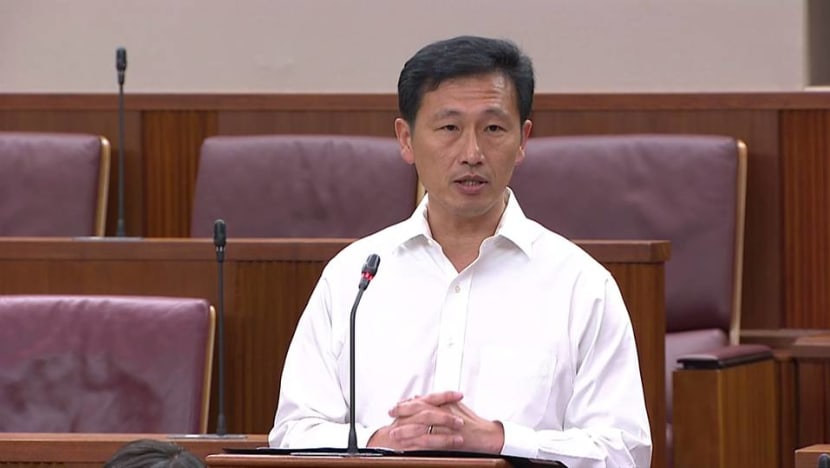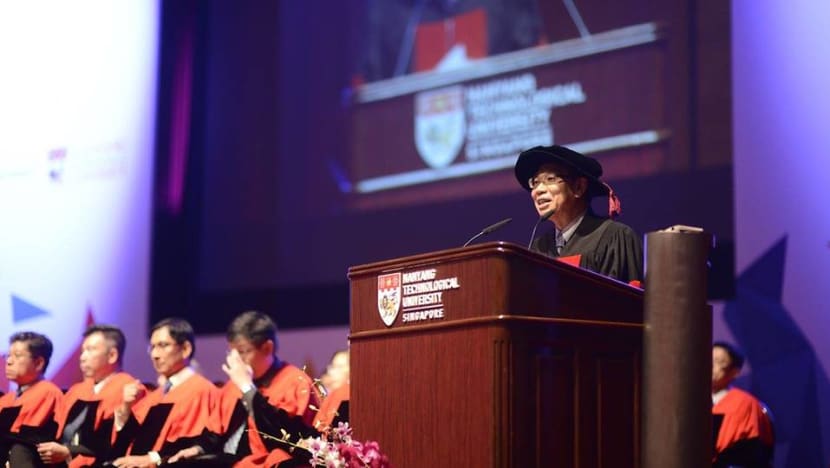commentary Singapore
Commentary: Why take up a postgrad education when I can Google almost anything?
Does a postgraduate certification still offer a career advantage for working professionals in a digital world? NIE Associate Professor Chang Chew Hung discusses its value.

A man holds his smartphone which displays the Google home page. (Photo: REUTERS/Regis Duvignau)
SINGAPORE: Lifelong learning is encouraged in Singapore through incentives and myriad opportunities through programmes such as the SkillsFuture Initiative.
Institutions of higher learning also present an attractive platter of degree programmes and micro-credentials for continual learning.
But in a world where one can Google for almost anything, some may argue knowledge is almost ubiquitous. At the heart of it is this question - do we still need to accumulate knowledge if we can call up information so easily?
For many of us who have completed our formal education, do such trends suggest that the value of pursuing additional formal education qualifications to move up the career ladder has vastly diminished?
Local media reports submit that such a debate about degrees versus skills has been underway. If so, it is useful to focus this discussion on what acquiring skills mean in today’s world.
In delivering the Budget 2018 statement earlier this month, Finance Minister Heng Swee Keat highlighted that the Singapore Government will continue to invest in education and skills upgrading to give every Singaporean the best chance to realise his or her potential and build deep skills for workers of all ages.
Minister for Education (Higher Education and Skills) Ong Ye Kung said during the Education Ministry’s Committee of Supply in Parliament that the Singapore education system should “anticipate the shape of things to come and build a system that can respond to and embrace the changes”.
He announced that autonomous universities will roll out micro-credentials, a repackacing of certain courses to create pathways that lead to smaller qualifications.
This ostensibly gives Singaporeans the flexibility and access to postgraduate education that will help them develop skills and knowledge relevant to their jobs.

READ: A commentary on Asia's shifting higher education landscape.
IS FORMAL LEARNING NECESSARY?
Having been at the forefront of graduate studies and professional learning, I empathise with postgraduate students who have their reservations about pursuing paper qualifications set against competing demands on money, time and commitment.
One cannot help but ask if pursuing a postgraduate degree, whether through micro-credentials or the entire course of certification, can really make the sum difference in one’s career after one has had years of industry experience and demonstrated a proven track record.
The question of why anyone needs formal learning remains even as there are options to pursue postgraduate education through smaller modules.
Indeed, some say as information relevant to workplace skills and knowledge have become more accessible, formal learning seems increasingly irrelevant.
Such questions are why as academic administrators of professional learning at the National Institute of Education (NIE), we have put much thought into how professionals in the teaching fraternity and other leading industries can have flexibility in the way they advance their learning.
Investing in a formal postgraduate education that teaches you to write reviews and carry out months of research seems out of step in an evolving digital era, where technical knowledge and mastery of a subject must be assimilated, processed and applied quickly.
After all, rapid technological advancements calls for a new generation of professionals who are highly adaptable and agile.

READ: A commentary on agility, the secret skillset companies are looking to hire.
SIGNALLING VALUE
All things considered, in my opinion, the utility of a postgraduate education remains high. It comes back to the question of relevance in the job market amid stiff competition.
Employers look for the best experiences and potential in the candidates they come across. The fact remains that a postgraduate education still has signalling value.
On top of achieving best grades in an undergraduate programme and developing formal expertise, a formal postgraduate education certification can offer a powerful indication that a candidate is highly responsive to new challenges.
Employers in the field also know tacitly that certain types of knowledge and skills require development over a sustained period of time – honing these with experts in a subject area will contribute to the professional development of the individual.
We see this too in subtle shifts in how postgraduate programmes aim to equip graduates with skills and work-relevant expertise that will carry them further in their careers.
In the past decade, postgraduate programmes have evolved tremendously to help students develop deep proficiencies in a wider scope of skillsets so that they emerge with deeper insights into a broader range of issues and a stronger ability to think creatively to solve real-world problems.
Postgraduate programmes also have great networking value. Postgraduate students engage with other like-minded professionals through the course of the programme and make valuable connections in various industries, before they embark on the next phase of their career.
They may also in time come to develop a community of best practices. They are open to new ideas which drive a renewed sense of passion.
WHAT PROGRAMME SHOULD I CHOOSE THEN?
It seems that the value of a postgraduate programme therefore can be subjective and unique to each person.
I have always asked my students: “What part of the programme you have completed benefitted you the most?”
Their replies vary but most generally appreciate the opportunities to advance critical thinking and new, meaningful ways to grow their capabilities.
A participant of the NIE Doctor in Education (EdD) programme, a research officer on adult education shared that the “learning experience in a postgraduate programme … developed my critical thinking and analytical capability which (are) fundamental competencies for the 21st century”.
He chose the EdD programme, a practitioner-researcher based higher degree, because it was directly relevant to his job.
In another example, new practices may be grasped and developed. A head of department for Physical Education (PE) in a secondary school said “The Master of Science (Exercise and Sport Studies) … introduced me to disability sports and inspired me to introduce it in my schools”. He subsequently incorporated disability sports into the PE scheme of work for Primary 4, 5 and 6 pupils.

ADD VALUE TO THE JOB IN NEW WAYS
Many higher learning institutes recognise that they have a high bar to meet because postgraduate learners are already established in their field with ample opportunities to develop job-relevant skills.
So a good programme needs a strong curriculum that incorporates ways to mature one’s capabilities to new levels of advancements in their areas of specialisation.
For instance, a radiation therapist in the Master of Arts (Counselling and Guidance) programme once shared: “I felt powerless to help cancer patients cope emotionally”. Completing her course, she was able to apply knowledge from her postgraduate about phobias and relaxation therapy to help patients practise mindfulness techniques in overcoming the fear of treatment.
Skills such as working in a team, developing new perspectives and supporting the social-emotional aspects of people postgraduate candidates come into contact with, are highly prized in a 21st century world.
So the argument that the ability to call up information instantaneously negates the relevance of further learning becomes tenuous.
Back to the question about what good does a postgraduate programme do if you can Google anything. How do you search for that which you do not know?
Postgraduate education, whether through full programmes or micro-credentials can help open minds. Incidentally, it does help one figure out what to google for and to discern if the search results are credible or relevant to one’s needs.
To this end, preparation and a clear goal in mind, solidifies the first steps toward a much-valued postgraduate learning journey.
Associate Professor Chang Chew Hung works at the Office of Graduate Studies and Professional Learning at the National Institute of Education, Nanyang Technological University, Singapore.















